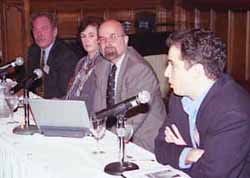The Wired Tower: Perspectives on the Impact of the Internet on Higher Education
E-learning has risen to the top of the higher education agenda because of its vast potential to open new doors.
It can improve instructional approaches, expand the support of technology outside of the back office, and serve new markets at a time of great demand for educated professionals in such fields as information technology and nursing. In the process, it is also changing higher education itself.
Leading educators, administrators, business professionals and investors, including Arthur Levine, President of Teachers College, offer widely diverse perspectives on the impact of the Internet on higher education in The Wired Tower (Prentice Hall) edited by Matthew Pittinsky.
On November 25th, at an event sponsored by the Office of Alumni Relations in the Milbank Chapel, Pittinsky moderated a panel including Levine, Carolyn Jarmon of Rensselaer Polytechnic University, and Donald Spicer, Chief Information Officer of the University of Maryland, Rensselaer Polytechnic.
Gary Natriello, Professor of Sociology and Education, provided a brief introduction of the book and the panelists.
The panelists discussed the changes that are being wrought by the Internet and related technologies, which aspects of Internet-related change offer the greatest long-term promise in higher education and which are superficial and should be rejected.
In The Wired Tower, Pittinsky and his contributors talk about the Internet, seeing it as the latest in a series of "macro-level" changes that have repeatedly transformed higher education and widened access to it. Pittinsky is Chairman of Blackboard Inc., a leading software company for e-education. He is also a doctoral student in the Sociology and Education program at Teachers College.
In the second chapter, "Higher Education: A Revolution Externally, Evolution Internally," Levine identifies key forces in shaping the higher education landscape today and applies them to the historic mission of universities. He talks about what needs to be preserved as well as what will be changed as technology transforms higher learning.
"One of the greatest risks we face as a nation in the growth of new educational providers is the unbundling of teaching, research and service functions," said Levine in the second chapter. "As teaching is weakened without linkage to knowledge creation, so too is knowledge creation without connection to preservation, and application uninformed by research. No modern society can afford to pay the enormous price that would be exacted should this combination be permitted to unravel."
Other contributors examine e-learning trends and the forces behind them in both the United States and internationally. Some of them tackle how e-learning is being implemented by describing numerous examples playing out on campuses and online across the country. They also talk about which changes offer the greatest long-term benefits and which should be rejected.
The Wired Tower helps to make sense of all the changes in higher education due to the Internet and other related technologies.
Published Thursday, Feb. 27, 2003
